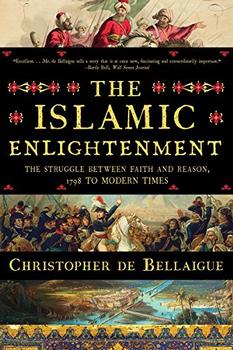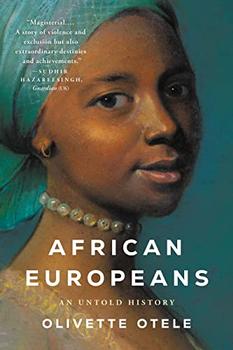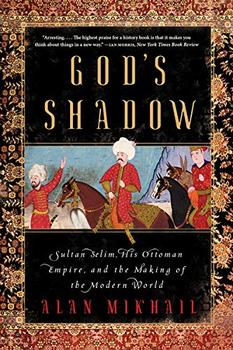Summary | Excerpt | Reviews | Beyond the book | Read-Alikes | Genres & Themes | Author Bio

The Struggle Between Faith and Reason, 1798 to Modern Times
by Christopher de BellaigueIn this comprehensive and well-researched history, de Bellaigue examines the evolution of Islamic thought and Mideast politics over almost two centuries, viewed through the eyes of some of its most revolutionary thinkers. Confining his study largely to events in Cairo, Tehran, and Istanbul allows for a sweeping narrative of major historical events including Napoleon's 1798 invasion of Egypt, the construction of the Suez Canal, and the rise of the Muslim Brotherhood. In addition to presenting the thoughts and feelings of those who lived through these events, De Bellaigue charts the destructive path of imperialism as France, England, the U.S., and other world powers have gone about exploiting the region for land, resources, and trade routes. This hindsight perspective provides a greater understanding of the scars and fissures that continue to haunt the Middle East today.
De Bellaigue covers the many rulers and politicians who worked to bring improvements to their people, notably Egypt's Muhammad Ali, Turkey's Midhat Pasha, and Iran's Amir Kabir, among others. Arguably the more interesting stories, however, are those of the local intelligentsia, modernizing thinkers who traveled beyond their borders and returned with knowledge of medicine, astronomy, democracy, and art.
Rifaa al-Tahtawi, the "'father of Egyptian identity'" received a five-year education in France in the 1820s where he marveled at the postal system as much as the writings of Rousseau and Voltaire. Ibrahim Sinasi brought an entirely new conception of journalism and drama to Turkey, while the radical Bahaism movement preached a kinder, gentler Islam in Iran. Female innovators like Huda Shaarawi and Halide Edib Adivar (see Beyond the Book) are celebrated for their political contributions to the region as well.
De Bellaigue's sources are impeccable and fascinating, including detailed travelogues, reports from diplomats (and their wives), personal journals, memoirs, and other firsthand documents. While he is certainly trying to provide a generally positive view of the history of the Islamic world, de Bellaigue is no apologist, he discusses the Armenian genocide, the "gradual anathemisation of homosexuality," brawling harems, and teenage brides with appropriate horror and distaste. Certainly few readers will walk away with more positive associations of the word "sharia" than they had before, the word tolls through the book in every region and time period as shorthand for radical, reactionary doctrine.
The Islamic Enlightenment attempts to right a perceptual fallacy of Eurocentrism, the belief that the Muslim world has always been, and will always be ideologically backward and oppressive. Including the word "Enlightenment" in the title is a well-chosen rhetorical flourish, but the truth seems to lie somewhere in the middle ground. Islam is not a religion of violent jihadists or peaceful disciples. Progress occurs in fits and starts. Modern ideas are introduced, embraced, and then trampled upon by religious reactionaries. One need only count the number of reformists in the book who were exiled or executed for their beliefs to see that "enlightened" is something of a misnomer. The more important project of The Islamic Enlightenment, however, is to explain how and why this cyclical process takes place, and de Bellaigue executes this aspect perfectly. The book begins with Napoleon's invasion of Cairo, and ends with the discovery of oil and the fallout from World War I, the carving up of the region by Britain and France that radicalized vast swaths of the population, triggering a religion-themed backlash against all things Western.
This remarkably vivid account has something for Islamic scholars and lay readers alike. It is accessible, not requiring a lot of prior knowledge, and detailed, populated by many lesser-known historical personages. Those seeking to understand the hornet's nest of Middle Eastern politics, conceived from the union of Islamic dogma and Imperialist meddling, could certainly opt to start here.
![]() This review was originally published in The BookBrowse Review in May 2017, and has been updated for the
August 2018 edition.
Click here to go to this issue.
This review was originally published in The BookBrowse Review in May 2017, and has been updated for the
August 2018 edition.
Click here to go to this issue.

If you liked The Islamic Enlightenment, try these:

by Olivette Otele
Published 2023
A dazzling history of Africans in Europe, revealing their unacknowledged role in shaping the continent.

by Alan Mikhail
Published 2021
An explosive global history that redefines the historical origins of the modern world through the life of Sultan Selim I and his Ottoman Empire.
Your guide toexceptional books
BookBrowse seeks out and recommends the best in contemporary fiction and nonfiction—books that not only engage and entertain but also deepen our understanding of ourselves and the world around us.